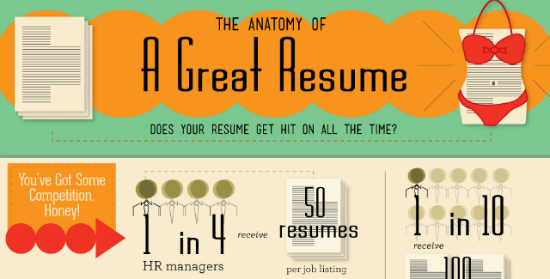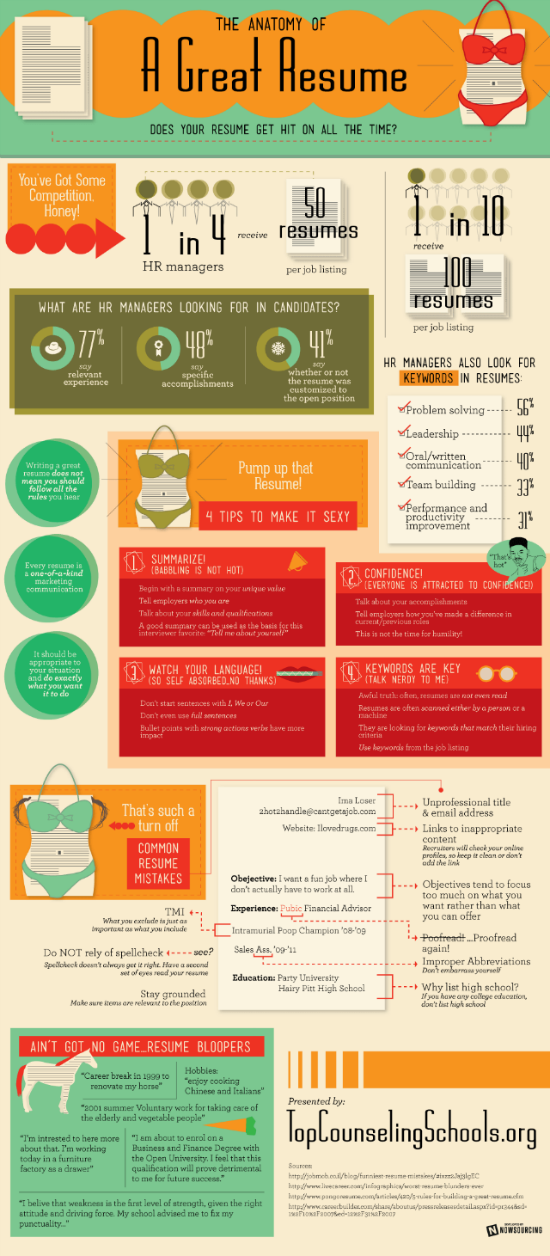Facts, Facts, Facts: The Anatomy of a Successful Resume (Infographic)
No matter whether you are seeking for a nine-to-five or whether you want to get that freelance job. It is always inevitable to make the best possible impression, be it on an employer or a client. How this best impression can be planned and crafted is the subject of a recent infographic. NowSourcing, internet marketers by profession, have put it together for TopCounselingSchool.org. If you are sitting over the papers, trying to write your resume, push them aside and read on...

Nothing New, But Still Important To Know: There Are Less Jobs, Than Seekers!
Let's dig into the facts right away. A quarter of all HR managers receive at least 50 resumes per job listing. Ten percent even receive 100 resumes for a single vacancy. I personally know of job listings that produced ten times this amount. On the other hand I just participated in trying to find an academic with a psychological background for a job quite well-payed. It took us months to find the right one, but not only because of a lack of qualified people, but foremost because of a lack of applications. According to my own experiences, it seems safe to say: the lower the needed qualification level is, the higher the amount of applications gets.
On the other hand, reaching a certain level of qualification does not say much about the real qualifications and capabilities a person has to offer. Especially in the field of web development I know of lots of people with high-end capabilities, coding at the edge of technology, while their formal qualifications are non-existent. If you are part of this (growing) group of people, it is important to build a solid foundation of successfully accomplished projects at the earliest stage possible. Not easy to do, when you've started out...
How Managers Separate The Wheat From The Chaff
Back to our infographic: Being an HR manager confronted with too many resumes, you need to lay out strategies to easily, yet effectively separate the wheat from the chaff. An easy method is not reading, but just scanning the resumes for certain keywords. This method already proves successful used in your favorite search engine. Why should it not be useful in other search environments?
Speaking of keywords, the most sought after skill is the ability to solve problems. Almost 60% of all managers claim to look for this capability in a person's resume. Leadership qualities as well as the ability to communicate flawlessly follow in the top 10 of relevant keywords. Team building is still important, though not as important as about ten years ago. Still, one third of managers calls this mandatory.
Generally, besides any keyword aspects, managers need to be able to relate the applicant to the job. This is achieved on different layers. First, the application should show relevant experiences, second, specific accomplishments. And, last, but definitely not least, the resume itself should be customized for the job in question. No-one likes to receive generic applications, where the employer would have to figure out, why the applicant applies for the job listed. Hint: No-one will actually do that, you're out.
Keep your resume as short as possible, as lengthy as necessary. Use keywords, keep a list style. The shorter you can get, the higher the chance gets, that your resume will at least be read.
At long last, you should avoid the most common errors. Orthography is king. You need not be perfect, but should at least not fall for the simplest mistakes. Next thing to avoid are unnecessary facts. Noone cares for your success in poop championships or leisure periods because of an acute form of general slackness.
What else should you avoid? This is common, though I never had the chance to find a reason for it. There is a reasonable amount of people out there, who take pride in inventing the most curious email addresses. You can of course do so, but please, for your own good, don't use an address such as [email protected] for sending in your resume. At least not if you really aim for this job...
Clicking on the following infographic leads you to the corresponding blog post over at NowSourcing:
(Source: NowSourcing / TopCounselingSchools.org)

